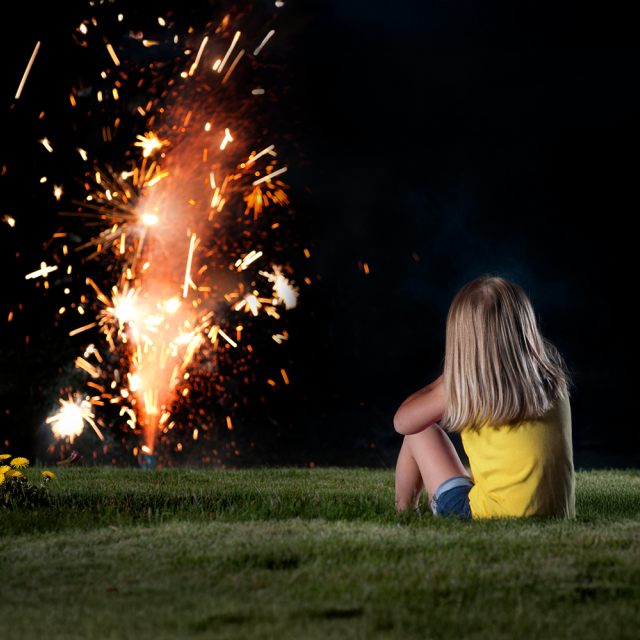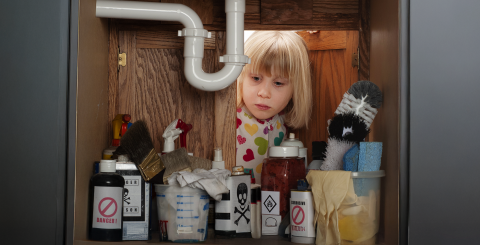Fireworks, brush fires, and potting soil fires: How to enjoy a safe outdoor fire at home

Before lighting fireworks or starting any kind of outdoor fire, always check the regulations in your municipality. Local rules can vary depending on weather conditions, season, and fire risk level.
Ah, summer! With long days and warm nights, it’s the perfect time to enjoy the outdoors around a campfire or with a fireworks display. But what may seem like a simple summer pleasure can quickly turn dangerous, threatening property and putting people at risk. Whether you’re planning a campfire, burning brush or debris, or setting off fireworks, it’s essential to take the right precautions. This guide will help you understand and prevent the risks of outdoor fires so you can protect your property, family, and community.
The dangers of outdoor fires
Whether for enjoyment or to dispose of waste, outdoor fires on your property can quickly spread to grasses and your lawn, and then to outbuildings and your dwelling. Windblown embers (also known as firebrands) can spark fires in nearby trees or fields, escalating into large-scale wildfires with potentially devastating consequences for both natural ecosystems and neighbouring communities.
The explosive risks of fireworks
Fireworks are a hallmark of celebration—but they come with serious risks if not handled properly. When misfired or used in dry or windy conditions, they can ignite fires that threaten homes, vegetation, and the safety of spectators. Firebrands from fireworks can easily ignite nearby flammable materials such as trees, shrubs, and soil, increasing the risk of both residential and forest fires. According to Société de protection des forêts contre le feu (SOPFEU), an average of three forest fires per year are caused by fireworks.
The risks of brush fires
Often sparked by land clearing or agricultural burning, brush fires pose another significant risk. They can spread quickly, consuming vast areas of vegetation and putting nearby homes in danger. Wind can easily carry hot embers and sparks from burning brush or waste, causing fires to spread with alarming speed. According to SOPFEU, an average of 75 forest fires per year are caused by burning waste.
Watch out for potting soil fires!
Did you know that potting soil can contain flammable materials such as peat moss, wood chips, polystyrene, and vermiculite? Many people are unaware that this hidden fire risk may be sitting right in their flowerbeds. Yet, potting soil fires lead to multiple home insurance claims every summer. These fires are often sparked by a smouldering cigarette butt or fireplace ashes that haven’t fully cooled. Once ignited, the fire can spread quickly through nearby combustible materials—threatening structures, vegetation, and neighbouring properties.
Outdoor fires: Valuable tips for preventing wildfires
Fire safety is everyone’s responsibility. When you choose to light an outdoor fire, you play a key role in preventing wildfires. Before starting any fire, always check whether an open fire ban is in effect. On the day you plan your fire, visit the SOPFEU website to check for any current restrictions. No matter the type of outdoor fire you have in mind, following best practices is essential to ensure a safe and worry-free experience.
Precautions for fireworks
Before organizing any group activity involving fireworks, it’s essential to check your local regulations. Each municipality has its own guidelines and restrictions, and following them is crucial to avoid fines and accidents. If your municipality allows fireworks and you’re 18 or over, here are some recommendations from SOPFEU for enjoying them safely.
- Carry fireworks in the trunk of your vehicle.
- To avoid the risks associated with smoking accessories, never smoke while handling fireworks.
- Do not use fireworks near wooded areas when the risk of fire is high or extreme.
- Choose an open area at least 30 m by 30 m.
- Follow the manufacturer’s instructions.
- Keep a large water tank, hose, or fire extinguisher nearby.
- Let your insurance company and local fire department know when and where you will be setting off fireworks.
- Use a stable ignition base, such as a bucket filled with sand or soil.
- Never consume alcohol while handling fireworks.
- Keep spectators at least 20 m away from the launch site.
- Wear long cotton clothing, gloves, safety goggles, and hearing protection.
- Consider wind direction and if wind speeds exceed 20 km/h, avoid lighting fireworks.
- Never hold lit fireworks in your hands.
- Use a flashlight to check and light fuses.
- After the fireworks display, inspect both the ignition site and landing area, and pick up any hazardous debris.
- Soak used or defective fireworks in a container of water for at least 30 minutes before disposal.
- Never dispose of used or defective fireworks in a fire or garbage bin. Follow your fire department’s guidelines for safe and proper disposal.
For more information on using fireworks safely, see SOPFEU’s prevention tips.
Best practices for preventing brush fires
The following tips apply specifically to private bonfires. They do not cover agricultural or commercial burns, which are subject to different protections. Before lighting an open fire, always check your municipality’s guidelines. Many communities require a fire permit and restrict open fires to certain times of year to reduce the risk to public safety. Often, using a wire mesh cover over the fire is mandatory to help prevent the spread of flames. If your burn is authorized, follow these key fire prevention tips:
- Ensure constant supervision by a responsible adult until the fire is completely out.
- Burn debris in small piles, no larger than 1 m by 1 m, for better control.
- Clear all flammable materials and vegetation within a 3 m radius of the burn area.
- Keep water and a shovel nearby at all times.
- Douse the fire thoroughly with water, and stir the embers.
- Before leaving, feel the ashes by to make sure they’re no longer giving off heat.
Remember: Composting, green waste collection, and recycling centre drop-offs are the safest and most environmentally friendly ways to dispose of waste.
Best practices for preventing potting soil fires
Because dry potting soil can be highly flammable, it’s important to follow simple precautions to reduce the risk of fire. Here are some tips to help prevent potting soil fires:
- Never dispose of ashes, cigarettes, or cigars in potted plants. Use a deep ashtray or a non-combustible container filled with sand and placed on a stable, fire-safe surface. Encourage guests to do the same.
- Choose nonflammable pots, such as those made from clay or ceramic, rather than plastic ones.
- Keep potting soil moist by watering plants, hedges, and garden beds regularly—or install an automatic watering system.
- Store potting soil and potted plants away from heat sources like barbecues, fire pits, candles, and flammable materials such as fuel, wood, or paper.
- Keep potting soil bags out of direct sunlight.
- If you’re lighting a fire on your property, use a fireplace with a screen, or build it on bare soil or gravel.
- Dispose of ashes safely after making a campfire or using a fireplace at home. Place them in a metal ash disposal container kept well away from any flammable materials—especially potting soil—and structures.
- Discard any leftover potting soil at the end of the season. Potting soil dries out over time, so buy only what you need each year and avoid reusing old soil.
Home insurance: Your protection against fire risks
Following government and municipal regulations, using safe outdoor fire ignition and control methods, and staying aware of weather conditions are key for reducing the risk of fires and keeping everyone safe. But even with precautions, accidents can happen.
If your outdoor fire causes bodily harm or physical damage to another person, you could be held liable. That’s why having proper home insurance—even if you live in an apartment—is essential. It includes liability coverage to protect you from the financial consequences of accidental physical damage or bodily harm to another person.
In addition, if your own property is damaged by an outdoor fire, your home insurance may cover repair costs, depending on your policy. It’s wise to keep an up-to-date inventory of your belongings, including everything that’s covered if a fire occurs in your back yard.
Have questions about home insurance and fire risks? Feel free to contact one of our damage insurance representatives today!




